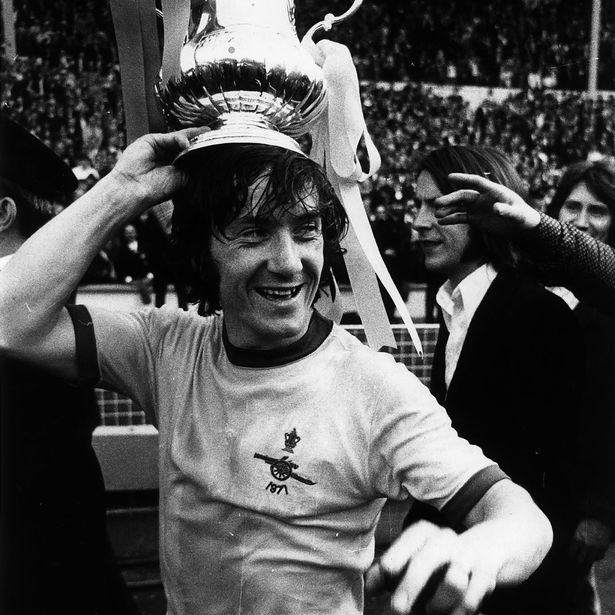
George “Geordie” Armstrong
Date of birth: 9 August 1944
Date of death: 1 November 2000 (aged 56)
Place of birth: Hebburn, County Durham, England
Nationality: English 🏴
Height: 5 ft 6 in (1.68 m)
Position(s): Winger
Arsenal Senior Career: XXX
Senior Apps/Goals: 621/68
General Information
George Armstrong (born August 9, 1944 – died November 31, 2000) was an English footballer and coach best remembered as one of Arsenal’s greatest ever wingers. Known for his tireless work ethic, pinpoint crossing, and unrelenting commitment, Armstrong became a symbol of loyalty and professionalism. Spending his entire top-flight playing career with Arsenal, he amassed more than 600 appearances for the club, winning the league and FA Cup during the famous 1970–71 Double season. Later, he returned to Arsenal as a coach, passing on his knowledge to younger generations and continuing his lifelong connection to the club until his untimely death in 2000.
Early Life
George “Geordie” Armstrong was born in Hebburn, County Durham, in 1944. Raised in a football-loving family in the North East, Armstrong quickly demonstrated a natural gift for the game. Like many youngsters in the region, he played football at every opportunity, often on streets and local pitches. His skill, determination, and outstanding stamina caught the eye of scouts at a young age, and by the early 1960s he was being courted by professional clubs. Despite interest from sides closer to home, it was Arsenal who secured his signature in 1961 when manager George Swindin offered him the chance to test himself at the highest level in London.
Arsenal Career Beginnings
Armstrong made his Arsenal debut in 1962, quickly establishing himself as a first-team player despite his youth. A left-winger of immense energy and intelligence, he became renowned for his accurate crossing and his willingness to track back defensively. By the mid-1960s, Armstrong was a fixture in the starting eleven, providing service for forwards such as Joe Baker and later John Radford. His reliability meant he was rarely injured or dropped, with his stamina becoming legendary among both teammates and opponents.
Key Contributions to the Double Side
The pinnacle of Armstrong’s Arsenal career came in the early 1970s. Under manager Bertie Mee, he played an instrumental role in Arsenal’s first ever European triumph, the Inter-Cities Fairs Cup in 1970. A year later, he was one of the key architects of the 1970–71 Double, supplying crosses, assists, and tireless running from the left flank. His contribution in the FA Cup Final against Liverpool was particularly memorable, as his relentless effort helped Arsenal overcome their opponents in extra time to secure the historic Double. Armstrong’s influence in this period cannot be overstated; he was the steady presence who linked midfield with attack and provided a consistent attacking outlet.
Consistency and Loyalty
Armstrong was admired not only for his technical ability but also for his consistency. He played more than 60 games in several seasons, rarely missing a match. By the time he left Arsenal in 1977, he had made 621 first-team appearances, placing him among the club’s all-time leaders. His loyalty and dedication earned him legendary status among supporters. Unlike many players of his era, Armstrong remained at one club for his entire top-level career, embodying the values of commitment and reliability that Arsenal fans cherish.
Later Playing and Coaching Career
After leaving Arsenal, Armstrong briefly played for Leicester City and then moved into non-league football, turning out for Stockport County and eventually ending his playing days with an American side, Sacramento Gold. However, his deep bond with Arsenal soon brought him back in a new capacity. In the 1990s, he joined the club’s coaching staff, primarily working with the reserves and youth teams. Players under his guidance often spoke of his passion, encouragement, and wealth of knowledge, describing him as a mentor who demanded effort but also inspired loyalty.
International Career
Despite his brilliance at club level, Armstrong was surprisingly underused by England. He never earned a senior cap, though he was called up to squads and represented England at under-23 level. Many fans and pundits considered it a great injustice that such a consistent and talented winger was overlooked by successive national team managers. Nevertheless, this did not diminish his reputation among Arsenal supporters, who valued his week-in, week-out contributions above all else.
Legacy
George Armstrong’s legacy at Arsenal is one of loyalty, excellence, and quiet professionalism. He was not the flashiest player, but his unselfishness, consistency, and technical skill made him an irreplaceable figure for over a decade. His 621 appearances remain a testament to his durability and commitment. As a coach, he influenced a new generation of Gunners, ensuring that his impact extended beyond his own playing days.
Tragically, Armstrong died suddenly in 2000 while still working for Arsenal as a coach, collapsing during a training session. His passing was a huge shock to the club, players, and supporters, but his contribution has never been forgotten. Today, he is remembered as one of the finest wingers in Arsenal’s history and one of the club’s true gentlemen. His story embodies the spirit of loyalty and dedication that defines Arsenal’s greatest servants.
| Season | Appearances | Goals |
| 1961 | 4 | 1 |
| 1962 | 16 | 2 |
| 1963 | 35 | 5 |
| 1964 | 42 | 5 |
| 1965 | 40 | 6 |
| 1966 | 47 | 8 |
| 1967 | 55 | 5 |
| 1968 | 38 | 8 |
| 1969 | 30 | 3 |
| 1970 | 64 | 8 |
| 1971 | 59 | 5 |
| 1972 | 37 | 3 |
| 1973 | 45 | 0 |
| 1974 | 34 | 2 |
| 1975 | 30 | 4 |
| 1976 | 45 | 3 |

